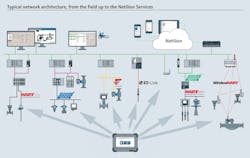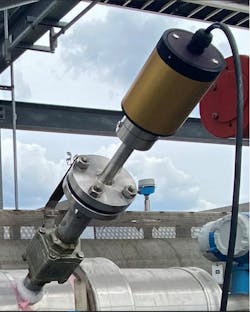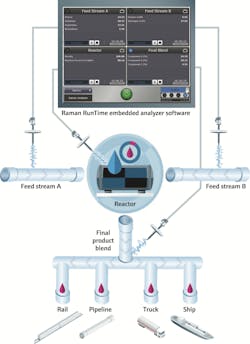Reliable LNG startup, commissioning and operations in a tight labor market
In the around-the-clock operation of liquefied natural gas (LNG) processing and transport, there is no room for downtime, and in recent years, these tasks have encountered a significant bump in the road.
Designing, building and operating LNG plants requires highly specialized skillsets, particularly for startup and commissioning of LNG measurement process units and instrumentation. However, due to the retiring workforce and a shortage of incoming personnel with the required experience and skillsets, the talent pool is quickly drying up.
Fortunately, digitalization is providing new ways of executing startup and maintaining efficient operations, decreasing processors’ reliance on large numbers of skilled staff. Compared to previous instrumentation, these new technologies provide clearer workload transparency — along with data metrics, field automation and optimized decision-making matrices — for addressing issues that can arise during commissioning and operation.
Increasing productivity and expanding the labor pool
Traditionally, startup and commissioning technicians spent around 15% of their productive time performing administrative activities, such as transferring data gathered from the field into electronic formats, writing progress reports, creating work orders and more. Sometimes, even these reports and orders were created originally with pen and paper, and later manually digitized and filed electronically.
These procedures are necessary to maintain compliance with strict EPA regulations surrounding all aspects of LNG processing. However, there are many methods available today to reduce the manual time requirements of these and other tasks.
With a plethora of digital tools available — including tablets, specialized software and internet and web services — these routine, manual tasks can be automated and streamlined, reducing the burden on startup and commissioning engineers and technicians, while freeing up their time for higher-level tasks. These modern tools also provide access to a wealth of data, and they help improve decision-making in the field by providing sufficient context and insights.
Efficient commissioning processes require three key elements: the right expertise, the right tools and access to the right information. Intuitive technology and software interfaces, akin to the smartphones and other devices people use every day, provide all three, making commissioning accessible to personnel without specialized training (Figure 1). This is subsequently increasing the market of commissioning technicians.
In addition to the right technological tools and software, readily available remote support provides extra human resources, coming in handy when issues arise that require a high level of expertise. Leveraging digital technologies, technical experts can be centralized and made available for multiple plants via secure remote connection and communication, increasing their skilled reach without requiring physical site proximity. These same sorts of support resources are also available from leading instrumentation and technical service providers.
No matter the size of a project or plant, digital commissioning strategies can yield significant overall efficiency gains.
Safety, productivity and efficiency
Accurate and reliable measurement of critical process parameters establishes a basis for safe and efficient operations throughout the natural gas value chain. To meet these needs, leading instrumentation and technical service providers maintain vast portfolios of best-fit instruments and solutions to provide precise process measurement and a host of real-time data for safe and efficient operation.
Applications across the industry frequently require SIL certification, including IEC 61508 instruments for use in hazardous areas, and compliance with safety-by-design standards. Therefore, contracting with suppliers that understand the full range of application requirements is essential to ensure safety and maximize uptime.
As processors struggle to staff highly skilled technical personnel, they are adapting to the changing market conditions by partnering with these providers to equip their plants with intuitive instrumentation, and to augment plant personnel with readily-available support staff. Support services include, but are not limited to:
- Commissioning and installation
- Project management
- Preventive maintenance
- Spare part express service
- Training
- Technical support
- Online documentation
- Asset management services
- Calibration services
Converting natural gas to LNG in a liquefaction plant typically involves four main processes with critical measurement points: pretreatment, acid gas removal and dehydration, fractionation to remove heavy hydrocarbons and liquefaction. Each of these operations requires reliable measurement and tight process control to ensure the continuous uninterrupted operation needed for on-time loading and shipment of LNG.
Particularly in light of the tightening labor market, LNG bunkering serves as a highly relevant example where state-of-the-art technology can vastly improve operations and maintenance capabilities. Using modern instrumentation with fewer mechanical parts to maintain, the requirements for manual physical labor and human data analytics are reduced. Additionally, newer measurement techniques are more accurate than predecessors, yielding increased operational reliability as well.
The following use case explores an LNG bunkering application, and it shows how improving the instrumentation, as well as digitizing the data, provided substantial measurement improvements and subsequent profit increases for this LNG bunkering company.
Use case: LNG bunkering
Annex VI of the MARPOL convention, adopted by the International Maritime Organization in 2005, established lower limits on nitrogen oxide emissions and fuel sulfur content to reduce air pollution from ships. While using low sulfur fuel oils and scrubbers are proven methods for meeting these stringent standards, the use of LNG as a bunkering fuel is typically preferred because it effectively “future proofs” the operation to additional requirements, such as carbon dioxide reduction.
Accurate measurement of LNG mass flow and purity during custody transfer is critical to avoid profit losses resulting from quantitative or qualitative discrepancies. These two parameters — mass and calorific value — determine the energy content of LNG transacted, which must be included in bunker delivery notes. LNG quality can be determined either in the liquid phase using Raman spectroscopy, or in the gaseous phase using gas chromatography (GC) after vaporization.
Issues with traditional measurements
LNG composition was traditionally measured using GC, which required transforming an LNG sample from its cryogenic liquid state to a room temperature gas. During this process, it was essential to eliminate partial and pre-vaporization of the LNG sample, which necessitated careful installation and proper maintenance to ensure full insulation and the elimination of hot spots in the sample vaporization and transport paths.
Improper or incomplete vaporization is usually the primary source of uncertainty in GC measurement of LNG composition, which translates to additional uncertainty in the energy content transferred. Vaporization systems are sensitive to LNG flow rates, so data during unstable flow is typically discarded, further decreasing accuracy of energy content transferred.
By contrast, Raman analyzers are nearly immune to LNG flow variations, so they provide a more complete measurement of calorific value. Modern inline Raman analyzers have very low maintenance requirements, lacking moving parts or insulation that can degrade, and these instruments require no consumables, such as calibration and carrier gases.
Improved instrumentation for LNG bunkering
The Endress+Hauser Raman Rxn4 analyzer for LNG with the Rxn-41 fiber optic probe for cryogenic service, for example, provides accurate measurement of the Wobbe Index, gross calorific value and full composition of bunkered LNG with up to 10 times lower uncertainty than GC-vaporizer systems. This ensures both the buyer and seller have an accurate and precise measure of the energy content of the LNG cargo during custody transfer transactions.
This rack-mounted analyzer is easily installed in a control room with fiber optic coupling to the Raman probe, which is mounted in the LNG pipe for in-situ measurement in the liquid phase (Figure 2), eliminating the need for costly vaporization, sample conditioning and transport of the vaporized gas to the analyzer for measurement.
The full Raman measurement solution for LNG custody transfer consists of the following:
- Raman analyzer base unit with laser and internal calibration.
- Fiber optic probe for cryogenic service.
- Fiber optic cable, ranging from 50 to 1,600 feet.
- Dedicated LNG custody transfer method valid for temperatures of 93K to 117K.
These embedded capabilities make commissioning simple, and further diagnostic and analyzer health data is recorded once online for use by maintenance and operations teams (Figure 3). Diagnostic data empowers these teams to identify instrumentation issues as they develop, and then preemptively perform predictive maintenance.
For example, by monitoring the signal-to-noise ratio of an optical signal slowly degrading due to a build-up of light-blocking material on optics, a team can determine the appropriate time to clean or replace the optics before the measurement becomes unusable.
Digital tools promote process improvement
Digitalization is disrupting every aspect of modern life, and it can be critical to leverage its benefits to augment the growing skills gap in the LNG industry and beyond. With personnel time and availability at a premium, processors must incorporate the right equipment, software and services into their workflows to maintain operations.
To meet these and other industry challenges, leading instrumentation and services providers are introducing out-of-the-box solutions and supplying support services, helping processors drive efficiency, control costs and meet project schedules. Partnering with these types of suppliers is also essential for today’s LNG operators to increase safety, hasten startup, maximize uptime, maintain profitability and improve process efficiency and quality assurance.
Cesar Martinez is an electronic engineer with more than 15 years of experience in the automation industry. He is passionate about automation, technology, digitalization and energy transition topics. In his current role at Endress+Hauser, Martinez serves as the Industry Manager for Natural Gas, LNG, Carbon Capture and Blue Hydrogen.
Endress+Hauser
www.endress.com
About the Author
Cesar Martinez
Cesar Martinez is an electronic engineer with more than 15 years of experience in the automation industry. He is passionate about automation, technology, digitalization and energy transition topics. In his current role at Endress+Hauser, Martinez serves as the Industry Manager for Natural Gas, LNG, Carbon Capture and Blue Hydrogen.



